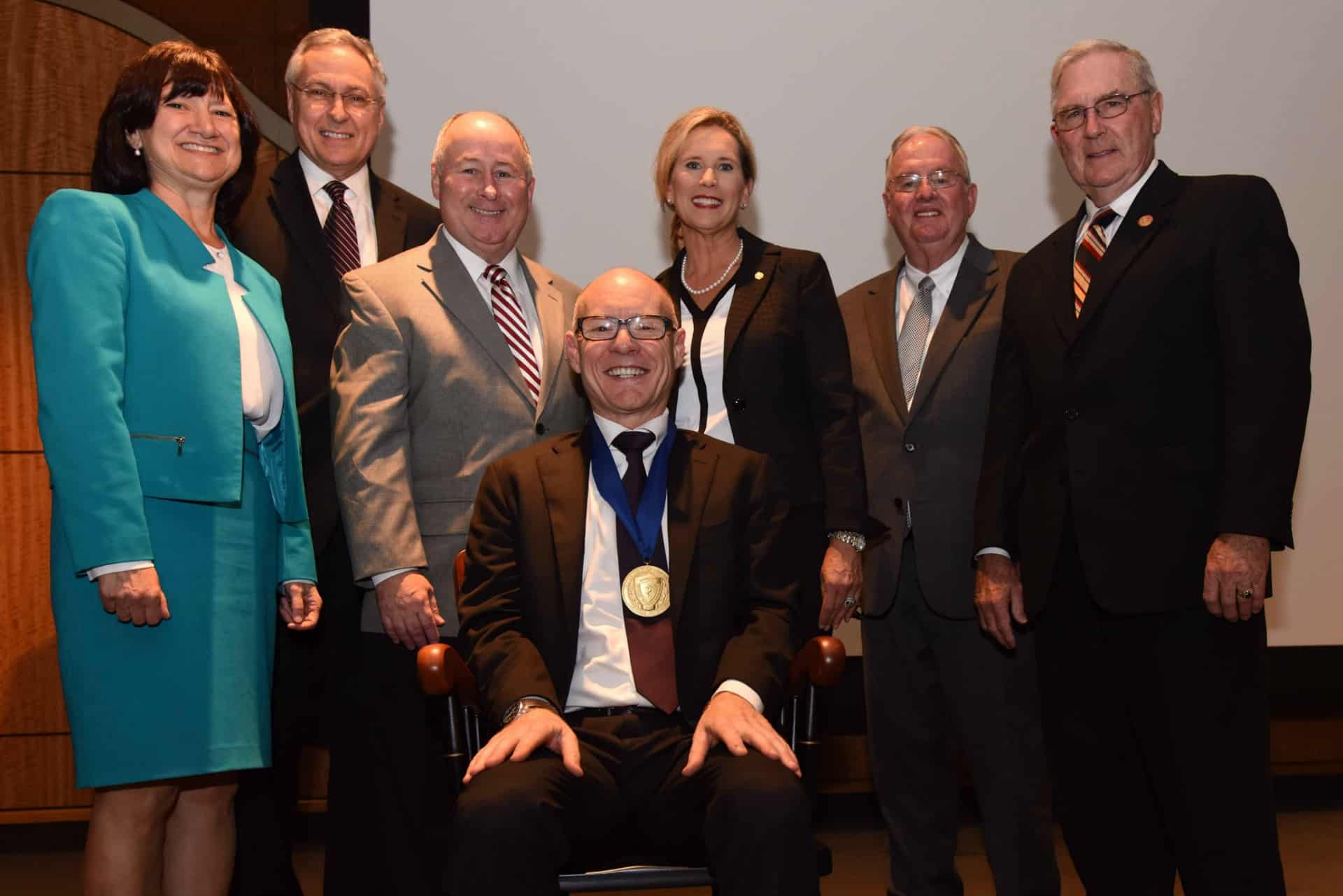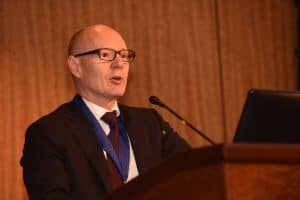Moseley Invested in First Arkansas Medical Society Distinguished Dean’s Chair
| June 12, 2017 | Pope L. Moseley, M.D., dean of the College of Medicine and executive vice chancellor at the University of Arkansas for Medical Sciences (UAMS), was formally invested June 8 as the inaugural recipient of the Arkansas Medical Society Distinguished Dean’s Chair.
Moseley, a leader in internal medicine and internationally recognized physician-scientist, came to UAMS in July 2015. He oversees the college’s interrelated missions to train the next generation of Arkansas’ physicians, develop new knowledge that leads to better health, and deliver world-class, patient-centered care. The college is the largest at UAMS and home to about three-fourths of the faculty, many of whom also serve in UAMS’ Graduate School, institutes and other units.
An endowed distinguished chair is the among the highest academic honors a university can bestow on a faculty member and is established with gifts of $1.5 million, which are invested and the proceeds used to support the educational, research and clinical activities of the chair holder and college. Those named to a distinguished chair are among the most highly regarded scientists, physicians and educators in their fields of expertise.
“An endowed chair is the highest honor that an academic institution bestows on its most distinguished faculty,” said UAMS Chancellor Dan Rahn, M.D. “Those funds can be used for salary support, they can be used for investment in programs that advance knowledge, and the overall goal of an endowed chair is to provide some flexible funds in a very tight environment that the chair holder can use to invest in ways that advance the human condition.”
Moseley was presented with a commemorative medallion by Rahn and Stephanie Gardner, Pharm.D., Ed.D., senior vice chancellor for academic affairs and provost.
“This is a great personal honor to be the holder of the first Arkansas Medical Society Distinguished Dean’s Chair,” said Moseley. “The chair is really not about me, though, it’s about the position. I am most grateful that it has been established because of what it means for the College of Medicine and those we serve. I’m grateful because it’s what we as the college can do to work with the medical society to create value in our medical system.
“This endowment will provide funds for wherever they are needed most. It will help us to meet unexpected challenges,” Moseley said. “And someday this chair will help us find the next dean, because it’s a powerful recruitment tool for us. It’s extremely important for this college and it’s extremely important for Arkansas.”
The UAMS College of Medicine and the Arkansas Medical Society share common roots extending to the 1870s and an ongoing commitment to improve health care in Arkansas through education, training and support for the very best physicians. By establishing a distinguished chair for the college’s most important leadership post, the society is making a transformative investment that will benefit Arkansas’ future physicians – and their future patients – in perpetuity.
Arkansas Medical Society President Amy B. Cahill, M.D., a 1995 UAMS graduate, noted that the doctors who originally started the College of Medicine were also members of the medical society.
“This day will go down in the archives of both the AMS and the College of Medicine,” Cahill said. “For the Arkansas Medical Society to have the honor of endowing the dean’s chair is a logical choice. Our histories have been blended for so many years as Arkansas physicians either attended school here or did their residency or have some attachment to this university. What better choice, what better alliance, what better society to anchor this than the Arkansas Medical Society.”
Moseley’s special guest speaker at the event was Matthew L. Cotten, Ph.D., of the Department of Viroscience at the Erasmus University Medical Centre at Rotterdam in the Netherlands and a researcher in virus genomics at the Wellcome Trust Sanger Institute in Hinxton, Cambridge, U.K. Cotten and Moseley started working together at the University of Iowa in 1984 and co-authored an article that appeared in Nature in 2000.
“Pope is incredibly good at appreciating details without losing track of the larger picture,” said Cotten, “and this is very important for a molecular biologist and a clinician, because in the end, you want to improve the medical health of the patient. There’s a new area in the type of medical research that we are capable of doing, and that’s to detect patterns in very large sets of electronic medical records. I think very quickly after this type of research emerged, Pope realized this was another way to look at details but also the big picture.”
Moseley came to UAMS from the University of New Mexico (UNM) School of Medicine, where he was a distinguished professor and led the Department of Internal Medicine as its chair for 14 years.
He is highly regarded both for his laboratory research focusing on cellular adaptations to exercise and for his expertise in disease systems biology. As an associate director of UNM’s Clinical Translational Science Center, which is funded by the National Institutes of Health, Moseley led comparative effectiveness research initiatives and oversaw development of the UNM Health Sciences Center informatics platform.
Among many initiatives at UAMS, Moseley has launched a major initiative to develop a top-tier biomedical informatics program. The rapidly growing field focuses on the design and use of sophisticated computational tools to manage and assess massive sets of medical and public health information to drive research and improve clinical care and health.
In addition, Moseley continues to oversee graduate students at the University of Copenhagen, in the Systems Biology Group of the Center for Protein Research, where they are developing an informatics approach to uncovering disease associations using the Danish National Health Registry.
Moseley received his undergraduate degree from Davidson College, his medical degree from the University of Illinois College of Medicine and a master’s degree in preventive medicine and environmental health at the University of Iowa.
He completed a residency in internal medicine and occupational medicine and a fellowship in pulmonary and critical care medicine at the University of Iowa. He is certified by the American Board of Internal Medicine, the American Board of Preventive Medicine (specialty in occupational medicine), and by the subspecialty board in pulmonary diseases.
Moseley was recruited to New Mexico in 1995 and served as chief of pulmonary/critical care and as senior associate dean for research prior to his appointment as chair of internal medicine. He also held the Reva S. Skelton Research Endowment and was a Regents’ Professor of the University.
The Arkansas Medical Society was created by and for physicians in 1875 and is now one of the most respected and influential health care organizations in Arkansas. The society is dedicated to improving health care in Arkansas and helping physicians focus on caring for their patients. It serves as an advocate, support system and source for health care news and resources.
UAMS is the state’s only health sciences university, with colleges of Medicine, Nursing, Pharmacy, Health Professions and Public Health; a graduate school; a hospital; a main campus in Little Rock; a Northwest Arkansas regional campus in Fayetteville; a statewide network of regional campuses; and eight institutes: the Winthrop P. Rockefeller Cancer Institute, Jackson T. Stephens Spine & Neurosciences Institute, Harvey & Bernice Jones Eye Institute, Psychiatric Research Institute, Donald W. Reynolds Institute on Aging, Translational Research Institute, Institute for Digital Health & Innovation and the Institute for Community Health Innovation. UAMS includes UAMS Health, a statewide health system that encompasses all of UAMS’ clinical enterprise. UAMS is the only adult Level 1 trauma center in the state. UAMS has 3,485 students, 915 medical residents and fellows, and seven dental residents. It is the state’s largest public employer with more than 11,000 employees, including 1,200 physicians who provide care to patients at UAMS, its regional campuses, Arkansas Children’s, the VA Medical Center and Baptist Health. Visit www.uams.edu or uamshealth.com. Find us on Facebook, X (formerly Twitter), YouTube or Instagram.###

